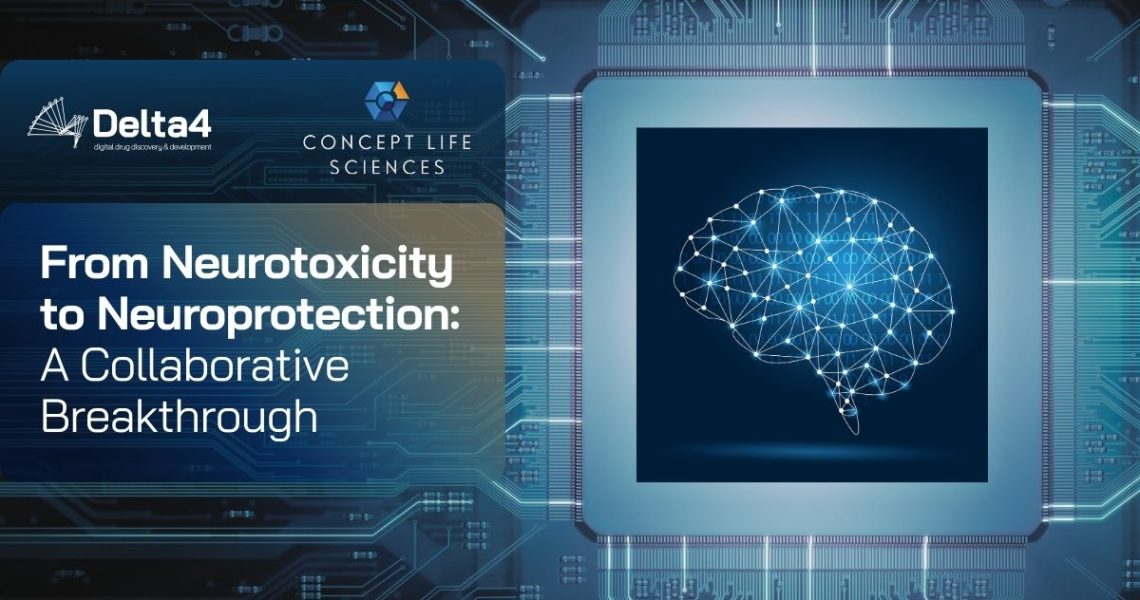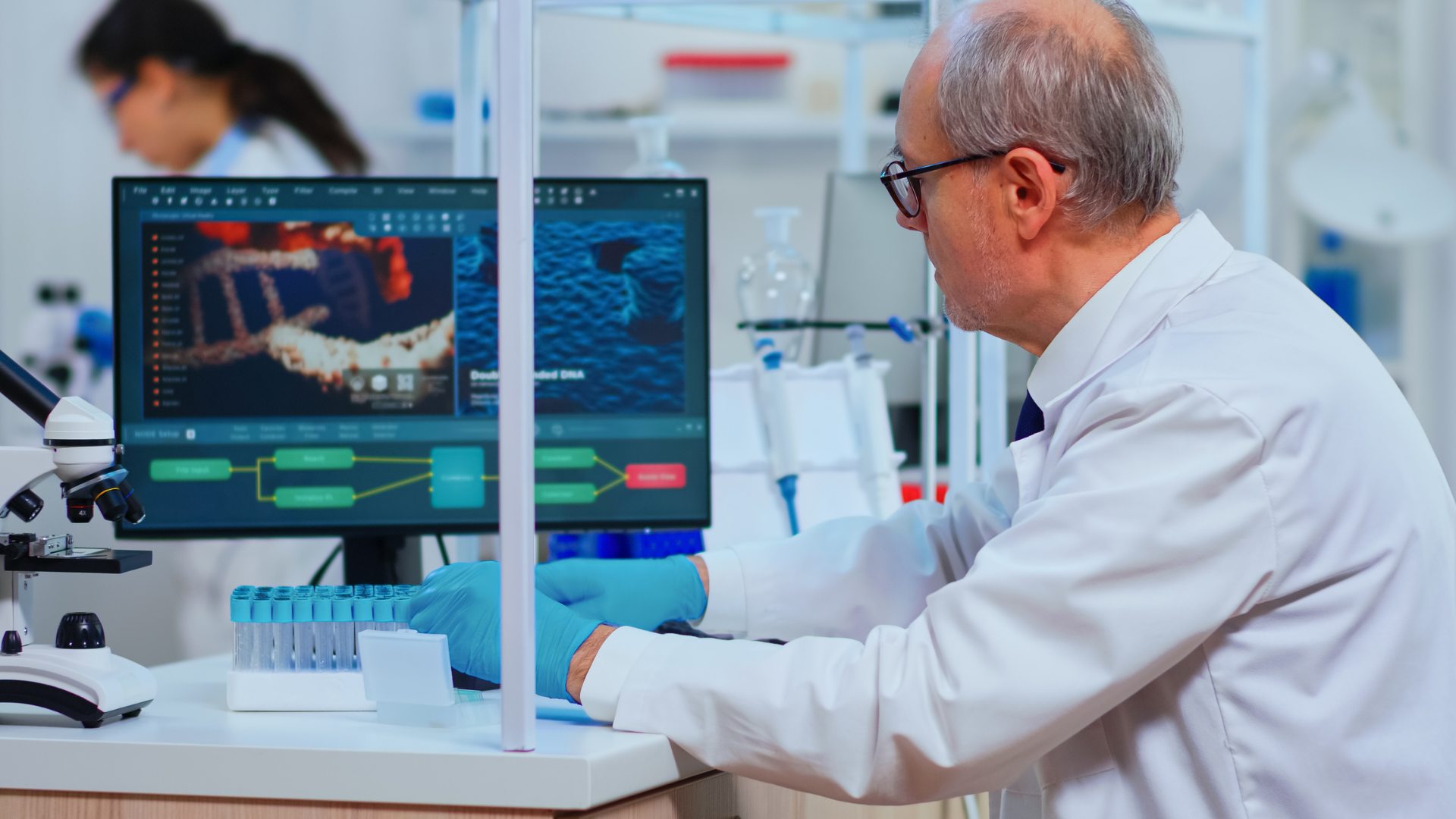We’re excited to present a major milestone in our collaboration with Concept Life Sciences: our joint poster presentation at this year’s BNA2025, one of Europe’s largest neuroscience gatherings, bringing together thousands of researchers and industry leaders.
This project combines the strengths of Concept Life Sciences’ neuroscience team with Delta4’s computational modeling to take on a key challenge in neuroscience:
- Can we stop – or even reverse – the formation of neurotoxic astrocytes?
- Can we identify compounds and their targets that reverse the pro-inflammatory state of reactive astrocytes?
Answering these questions could unlock entirely new therapeutic options for devastating neurodegenerative diseases where inflammation accelerates progression.
What started as bold research questions has evolved into a close exchange between the teams at Concept Life Sciences and Delta4, supported by the Hyper-C platform – uniting experimental biology and computational power to uncover new therapeutic avenues in neuroinflammation.
Targeting Reactive Astrocytes: The Science Behind the Collaboration
Astrocytes are the brain’s support crew, essential for maintaining homeostasis and protecting neurons. But when exposed to chronic inflammation, they can switch sides, becoming neurotoxic and accelerating the progression of diseases like Parkinson’s (PD), Multiple Sclerosis (MS), Alzheimer’s (AD), amyotrophic lateral sclerosis (ALS), and stroke.
Typically, microglia (a specific type of glial cells) are viewed as the main therapeutic target in neuroinflammatory diseases. Therefore, targeting astrocytes opens up an alternative and potentially complementary therapeutic strategy.
In this pilot project, Concept Life Sciences generated transcriptomic data from human iPSC-derived reactive astrocytes, stimulated with a cytokine cocktail to mimic a neuroinflammatory environment.
Delta4 then stepped in with Hyper-C, our proprietary AI-powered platform. By integrating Concept Life Sciences’ experimental data, we built a mechanistically and omics-informed model of reactive astrocytes, allowing us to simulate disease states, screen thousands of compounds virtually, and identify promising drug targets.

“Among multiple promising candidates, we validated our approach by identifying not only novel targets, but also confirming known mechanisms – like the role of Istradefylline, an approved PD drug, acting via Adenosine A2A receptor – in our model.”

Samuel Walter, MSc
Computational Biologist
Delta4
Why This Collaboration Works
Computational models hugely benefit from custom-generated data to enrich the generic mechanistic landscape. That’s where Concept Life Sciences’ neuroscience expertise came in. Their ability to generate high-quality, biologically relevant data gave our models the depth and precision needed to uncover specific mechanistic insights. Delta4 provided the computational framework to transform that data into actionable results.
This feedback loop – experimental biology refining computation, and vice versa – allowed us to pinpoint novel as well as known drug targets with greater confidence and biological relevance.
More than a single success story, this pilot demonstrates a blueprint for future collaborations: uniting experimental biology with advanced computational modeling to accelerate drug discovery.
What’s Next?
This pilot project demonstrated how fast and effective AI-supported research can be.
Next, Concept Life Sciences plans to experimentally validate some of the most promising compounds we identified – ones that might inhibit or even reverse the harmful, neurotoxic state of reactive astrocytes.
And there’s more: we shared these insights and results in a joint webinar on September 30th, 2025.
If Neuroinflammation is On Your Radar, You Won’t Want to Miss Our Webinar
Are you curious about how computational modeling can reveal druggable targets in neuroinflammation?
Watch our webinar with Concept Life Sciences, where we dive deeper into our approach, the results of this project, and what’s next on our roadmap toward potential new neuroprotective therapies.
Neuroinflammation is an emerging frontier in neuroscience – and collaborations like this are shaping the path ahead.
About Concept Life Sciences
Concept Life Sciences is a leading contract research organisation (CRO) serving the global life sciences industry. For over 25 years, the company, and its heritage companies, have provided consultative and collaborative drug discovery and development services. Their approach, supported by passionate scientists and world-leading capabilities, enables clients to overcome complex scientific challenges across a broad range of therapeutic areas, improving program success rates. Concept Life Sciences has successfully helped 29 candidates advance to the clinic.
The company has approximately 230 employees, with around 70% holding PhDs. It operates from state-of-the-art UK facilities, headquartered near Manchester, with additional operations in Edinburgh, Dundee, and Sandwich. The headquarters is one of the UK’s largest medicinal chemistry CRO sites with key discovery services all under one roof.
About BNA2025
The British Neuroscience Association (BNA) is the largest UK organisation dedicated to supporting and promoting neuroscience. It brings together researchers, clinicians, industry partners, and policymakers to advance understanding of the brain and nervous system. Through conferences, workshops, publications, and its flagship biennial event, The International Festival of Neuroscience—one of Europe’s largest neuroscience gatherings—the BNA provides a platform for sharing discoveries, fostering collaboration, and translating brain research into societal and clinical impact.

The BNA2025 took place in Liverpool and hosted hundreds of sessions, poster presentations, and networking opportunities for the global neuroscience community.


